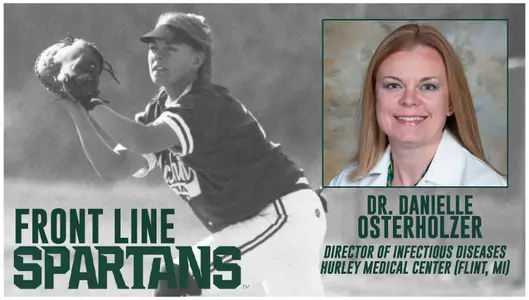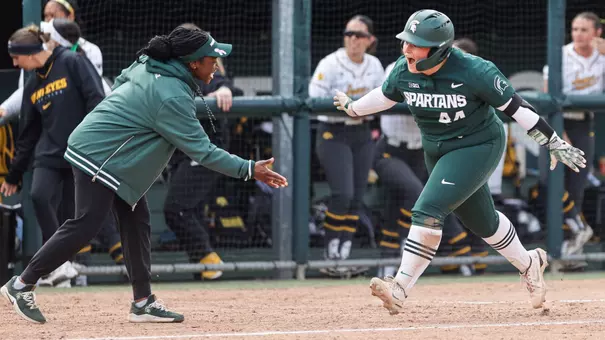
Front Line Spartans: Dr. Danielle Osterholzer
6/24/2020 12:16:00 PM | Softball
Dr. Danielle (Manzardo) Osterholzer is the Director of Infectious Diseases at Hurley Medical Center in Flint, Michigan and also an Assistant Professor of Internal Medicine and Pediatrics here at the Michigan State College of Human Medicine. She shares with us what the last three months have entailed as she and her colleagues have been at the forefront of trying to manage healthcare in the COVID-19 pandemic.
During her time at MSU (1994-98), she was a four-year letterwinner, three-time Academic All-Big Ten selection, and a member of the 1997 MSU team that advanced to the NCAA Tournament.
 Can you tell us about your MSU experience – your major, how early you knew you wanted to pursue a career in medicine, and how MSU prepared you for your future career?
Can you tell us about your MSU experience – your major, how early you knew you wanted to pursue a career in medicine, and how MSU prepared you for your future career?I came to MSU in 1994 with a plan to go to medical school. I was pre-med and majored in Zoology, which at the time was the best way for me to complete all my requirements. The Big Ten education I received at MSU combined with the experience I had participating in intercollegiate athletics helped prepare me for the academic rigor of medical school and the physical and psychological stress of medicine. Balancing both in college was extremely difficult however, after that, I was prepared for anything!
Can you briefly tell us about your path to Hurley?
After graduating from MSU, I attended Wayne State University School of Medicine in Detroit finishing in 2002. Then, I matched in an Internal Medicine/Pediatrics residency program at Indiana University (IU) School of Medicine in Indianapolis, IN. I spent 4 years training there to become board certified as a General Internist and Pediatrician. I decided to specialize in Infectious Diseases (ID) so trained for 2 more years at IU graduating in 2008. I joined the faculty of the Departments of Medicine and Pediatrics there after graduation and began to practice both Adult and Pediatric Infectious Diseases. During this time, my husband and I had three kids in 4 years. In 2013, after living in Indiana for over a decade, we moved back to MI to be closer to family. I worked for 2 years as an ID Faculty physician at St John Medical Center in Detroit, MI. Both my husband and I are from the Flint area and our parents still live in Genesee County, so when a job opportunity opened up at Hurley Medical Center (HMC), I had to take it. I have an academic appointment at the MSU College of Human Medicine and have the Spartan "S" embroidered on my white coat so I feel as if I have come full circle.
As an infectious disease specialist, what did your "normal day" look like before the pandemic?
Pre-COVID (as we like to say), I divided my time between seeing patients, teaching medical students and residents, administration, and research. My job is a bit different than an ID physician in private practice who is likely seeing patients every day in the clinic and the hospital. My "typical day" is different depending on the day or the week. Sometimes, I am seeing patients who are admitted to the hospital who require consultation from an ID physician for various complicated infections. Other days, I am seeing patients in my outpatient clinic, attending meetings, teaching, writing papers, or otherwise working on protocols or procedures for the hospital. The variety keeps it interesting and allows for as much work life balance as possible.
As Covid-19 rapidly grew in the Detroit area and made it one of the hotspots in the country, how did your facility and coworkers respond?
Given what was going on in Detroit, we knew that it would only be a matter of time before the virus came to Genesee County. We formed a multidisciplinary COVID team lead by Dr. Michael Jaggi, Chief Medical Officer, which met early each morning. Each day brought new challenges and decisions. I talked to many of my ID colleagues that work in Detroit to learn from them. We spent days and nights reviewing the reports coming out in the medical literature and from public health to inform our approach. Cases exploded fairly quickly and we were pushed to near our max ability to care for the critically ill. There was a lot of anxiety amongst our healthcare workers, initially due to unknowns regarding routes of transmission and whether we would have enough personal protective equipment (PPE) as well as resources to take care of all the sick patients. Despite this, brave healthcare workers stepped up to take care of COVID patients and our hospital rallied. Cases peaked about 2 weeks after the shut down and have now been steadily decreasing. Hurley is accustomed to rising to the occasion and taking care of one of the most vulnerable and underserved populations in Michigan if not the country. I am proud of how we responded.
What are some of the things that you have learned through this that will help you in the future?
We have learned much about the virus, how it affects patients, how it is transmitted, and just how contagious it is. We've learned how to effectively contain the virus in the hospital. And yet, there is still more to learn. This virus is like nothing we have seen before. I've learned a lot about people too and that when presented with adversity and challenges, most of our community and healthcare workers will dig deep to help each other.
Can you speak to just how much the stay-at-home orders have helped curb the larger spread of disease?
We know this virus is spread person to person and that asymptomatic individuals can spread the disease. It has become clear over time that this virus is more contagious than other respiratory viruses we are used to seeing. We know that our cases peaked about 14 days after the shut down, which is within the incubation period of the virus. This means much of the transmission was halted at that time point. We are still seeing some cases coming in but I cannot imagine what it would have been like if the shut down would not have happened. Our community did a great job of taking the advice of public health officials and staying home. Even with this herculean effort, we had 1,926 cases and 240 deaths in Genesee County through May 21, 2020 - and those were only the known confirmed cases. It is likely there were many many more as access to testing was severely limited.
What is your best advice for those who have been lucky enough to stay healthy as the state begins "opening up"? What can all of us do for our personal safety that also mitigates the spread?
I cannot emphasize enough that this virus is extremely contagious and is easily spread amongst groups in close contact with each other especially if indoors. Many reports show that asymptomatic people can infect others. Eating, singing, or doing other activities together that put respiratory secretions or saliva into the surrounding area are high risk. We should not go from this mitigation stance back to our old ways of interacting. This will erase all the sacrifices we have made to this point. Unfortunately, life has changed for the foreseeable future. Use hand sanitizer or wash your hands frequently and wear a face covering (properly over the nose AND mouth) in public to prevent your secretions from contaminating the environment. Avoid handshakes and touching your eyes, nose, or mouth. Stay at least 6 feet apart as much as possible. Be careful around the elderly and those with chronic diseases. If you have any symptoms at all, even minor ones, get a nasal swab test for the virus and quarantine yourself. We have to stay vigilant to prevent a second or third or fourth wave of disease. This is what keeps ID doctors up at night. I can only hope people continue to take this seriously.
A Road Less Traveled | Spartans All-Access
Thursday, April 17
A Higher Standard | Spartans All-Access
Tuesday, February 11
Spartans All-Access: Jenae Wash
Thursday, April 11
Spartans All-Access: Coach Sharonda McDonald-Kelley
Thursday, April 20




